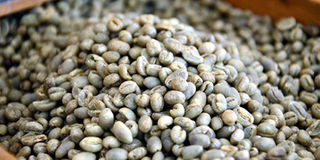GMO odium coffee history repeating itself

Coffee beans are among the most important tropical export commodities providing pleasure. PHOTO | FILE | NATION MEDIA GROUP
What you need to know:
- The projects revitalising the cotton sub-sector, through commercialisation of high-performing Bt cotton, will create 680,000 direct jobs in cotton farming.
- But the fear of losing prime market share to GM foods that have been proven safe, cheaper and, hence, more attractive to consumers is evident.
A cloud of resistance hangs over the introduction of genetically modified organisms (GMOs) in Kenya.
Varied views have emerged as the country moves closer to commercialising GM cotton, considered a big enabler to the ‘Big Four’ agenda.
The projects revitalising the cotton sub-sector, through commercialisation of high-performing Bt cotton, will create 680,000 direct jobs in cotton farming and 210 opportunities in ginning, 6,000 in integrated mills and 25,000 in garment manufacturing.
Uncertainties created by technophobes instil fear among the public and cause policy stalemate.
Yet, more than two decades of biotech crop cultivation has seen trillions of meals served with no harm.
Science academies, professional associations and global science leaders have endorsed GM crops to be as safe as their conventional counterparts.
INNOVATION
But while some people hold strong moral and ethical views on GMOs based on religious and cultural beliefs, the fierce opposition can be traced to emerging organic farming businesses and environmental “preservationists”.
The fear of losing prime market share to GM foods that have been proven safe, cheaper and, hence, more attractive to consumers is evident.
Trade wars, lifestyle ideologies, personal biases and political undertones drive the agenda.
The hostilities to GMOs are akin to the ancient resistance to inventions that revolutionised our lives. History shows that major innovations experience three stages: Ridicule, discussion and adoption.
DETRACTORS
According to a 2016 publication, Innovation and its Enemies, coffee, celebrated as one of world’s oldest transformative innovations, was once an object of intense smear campaigns and heavily demonised in Italy as the “devil’s drink”.
In England, France and Germany, the beverage was said to cause sterility and hysteria as medics linked it to serious health risks.
So dire was the controversy that, in France, scaremongers claimed “burnt particles” in coffee have violent energy that enters the blood, attacks the lymph system and dries the kidneys, and its consumption damaged the brain and turned the consumer into a zombie.
Interestingly, the crux of this resistance, which remained a “top secret”, was that coffee was deemed a threat to incumbent industries — especially brewing, with fears it would become a commercial powerhouse and topple wine and tea.
WELFARE
Coffee beans are among the most important tropical export commodities providing pleasure, wealth and livelihoods for millions of people with coffee an integral part of most cultures.
Interestingly, nine out of top 10 coffee-consuming nations are in Europe — where the fiercest GMO opponents reside, the largest chemical manufacturers thrive and biggest donors of the fancied “organic, natural, agro-ecology” farming methods to developing countries.
European public biotech companies (bio-pharmaceutics) generate annual revenue of up to Sh2.7 trillion, employing 70,000 people.
The President’s determination to improve the quality of Kenyans’ lives by embracing modern tools such as genetic engineering in agriculture and health is, therefore, strategic.
Dr Karembu is director, International Service for the Acquisition of Agri-biotech Applications (ISAAA) AfriCenter, and founder chair, Africa Women for Biosciences (AWfB) — Kenya Chapter. [email protected]




